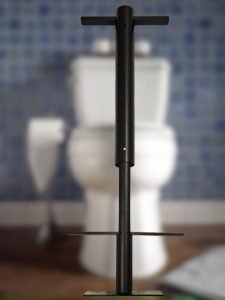
Poop & Weight Loss/Gain: How Your Bowel Health Impacts Your Scale
Your scale isn’t measuring fat — it’s measuring what your gut hasn’t let go of. Hidden stool retention, slow motility, and gut bacteria can quietly

Home » Breaking Down Bloating: Common Causes and How to Beat It
If you’ve ever experienced the uncomfortable sensation of a swollen belly after a meal or felt like your stomach might pop after just a few bites of food, you’re not alone. Bloating is one of the most common digestive complaints, affecting millions of people every day. But here’s the thing: while bloating might be widespread, it doesn’t have to be your everyday norm. So, let’s break down the mystery of bloating, explore the most common causes, and arm you with simple, actionable tips to help beat the bloat for good.
This isn’t just about temporary fixes; it’s about getting to the root of the problem, improving your gut health, and feeling your best every day.
Bloating is often described as a feeling of fullness, tightness, or swelling in the abdomen. It can make your stomach visibly distend, leaving you feeling sluggish, uncomfortable, and even self-conscious. Bloating can strike at any time — sometimes right after a meal, other times out of nowhere. But what’s really happening inside your body?
In most cases, bloating occurs when your digestive system is having trouble processing food or when there’s an excess buildup of gas in your stomach and intestines. This can happen for a variety of reasons, from eating too fast and swallowing air to food sensitivities and imbalances in gut bacteria. In other words, bloating isn’t just about what you eat; it’s also about how your body handles what you eat.
But before you resign yourself to a life of uncomfortable waistbands and stomach bloat, know this: bloating can often be controlled, reduced, and even eliminated with the right strategies. It’s all about understanding the underlying causes and making a few adjustments.
Let’s dive in.

If you’ve ever polished off a big meal only to be hit with bloating and discomfort, you’re likely familiar with some of the dietary culprits. But it’s not always the obvious suspects like overeating that lead to bloating. Some foods, even in small amounts, can wreak havoc on your digestion, leaving you puffed up like a balloon.
You might not think of sodium as a direct cause of bloating, but it plays a big role. Here’s why: sodium causes your body to retain water, and when your body holds onto more water than it needs, you get that heavy, bloated feeling. It’s like when your fingers swell up after eating a salty meal, except it’s happening in your stomach.
The problem is that sodium lurks in many places you wouldn’t expect. Processed foods, canned soups, frozen dinners, deli meats, and even some “healthy” snack foods are often loaded with sodium. Sure, your taste buds might love that extra salt, but your stomach? Not so much.
How to beat the bloat:
If you’re a fan of soda, seltzer, or any other fizzy drink, you may be unintentionally contributing to your bloating woes. Carbonated drinks are packed with bubbles, and when you consume them, those bubbles don’t just disappear; they often end up trapped in your stomach.
Once inside, this gas can either make its way out through burping (classy!) or work its way down into your intestines, leading to that familiar bloated sensation.
How to beat the bloat:
FODMAPs — ever heard of them? They’re a group of short-chain carbohydrates that are notorious for causing digestive issues, especially bloating. FODMAPs (which stands for Fermentable Oligosaccharides, Disaccharides, Monosaccharides, and Polyols) are found in a wide variety of foods, including some healthy ones like garlic, onions, and certain fruits and vegetables.
The problem is that these carbohydrates are not easily digested, so when they reach your large intestine, they ferment. This fermentation process produces gas, and that gas leads to—you guessed it—bloating.
Some people are more sensitive to FODMAPs than others, particularly those with irritable bowel syndrome (IBS). But even if you don’t have a diagnosed condition, consuming high-FODMAP foods can still trigger bloating.
How to beat the bloat:

Your gut is home to trillions of bacteria — good and bad. These bacteria are vital for digestion and overall health, but they can also play a starring role in the bloating drama. Here’s the scoop: when you eat, your gut bacteria help break down food. But in doing so, they sometimes produce gas as a byproduct.
For some people, the balance of bacteria in the gut can be off, with too many gas-producing bacteria and not enough of the beneficial ones. This imbalance can lead to bloating, especially after meals.
Your gut microbiome is like a mini-ecosystem living inside your digestive tract, and it’s made up of thousands of different species of bacteria. These bacteria have different jobs, including digesting food, producing vitamins, and supporting your immune system. Some bacteria even produce gases like hydrogen, methane, and carbon dioxide during digestion.
In a healthy gut, the good bacteria help regulate gas production and maintain balance. But when that balance is off — whether due to a poor diet, stress, antibiotics, or other factors — gas production can go into overdrive, causing uncomfortable bloating and gas.
Fermentation is a natural part of digestion, but when it happens too much or too quickly, the result is excess gas. When certain carbohydrates aren’t fully digested in your small intestine, they pass into your large intestine, where bacteria go to work breaking them down through fermentation. This process produces gases like hydrogen and methane, which can lead to bloating, discomfort, and even changes in bowel habits.
Foods high in fiber, especially fermentable fibers like those found in beans and cruciferous vegetables, are prime candidates for fermentation. While fiber is essential for gut health, too much too fast can cause bloating.
How to beat the bloat:
You’ve likely heard a lot about probiotics lately — and for good reason. Probiotics are live bacteria that can help replenish the good bacteria in your gut, improve digestion, and reduce bloating. Think of them as reinforcements for your digestive system.
Prebiotics, on the other hand, are non-digestible fibers that act as food for your gut bacteria. By feeding your good bacteria, prebiotics help them grow and thrive, which in turn can improve digestion and reduce gas production.
How to beat the bloat:

It may surprise you to learn that the way you sit and even how you go to the bathroom can affect your digestion. Poor posture, particularly when sitting or standing for long periods, can compress your internal organs and slow down digestion, leading to bloating.
And when it comes to elimination, the position in which you sit on the toilet can also make a big difference. If you’re not properly aligned, you may not be eliminating as completely as you should, which can lead to a buildup of gas and bloating.
When you slouch or hunch over, it’s not just your spine that’s affected; your intestines and stomach get squished, too. This can make it harder for food to move through your digestive system, slowing down digestion and increasing the likelihood of bloating.
Poor posture can also make you more prone to swallowing air, which can further contribute to gas and bloating. Sitting or standing with a straight back, shoulders down, and chest open can help your digestive organs function more efficiently.
How to beat the bloat:
Enter The PoopSTICK, a tool designed to help you achieve the optimal position for elimination. Inspired by the natural squatting position, The PoopSTICK allows you to raise your knees above your hips while sitting on the toilet. This position straightens the rectum, making elimination easier and more complete, reducing the likelihood of leftover stool that can cause bloating.
The concept is simple but effective: by aligning your body correctly, you’re essentially giving your digestive system a helping hand.
How to beat the bloat:

Bloating isn’t just about what you eat or how you sit; your overall lifestyle plays a huge role in how your digestive system functions. Stress, lack of sleep, and inactivity can all contribute to poor digestion and bloating. But with a few mindful changes, you can significantly reduce bloating and improve your gut health.
We live in a fast-paced world, and eating quickly is often a byproduct of our busy schedules. But when you eat too fast, you tend to swallow air, which can contribute to bloating. Plus, quick eating doesn’t give your stomach time to signal your brain that you’re full, leading to overeating and digestive discomfort.
How to beat the bloat:
Water is essential for digestion, and staying hydrated can help prevent bloating by keeping things moving smoothly through your digestive system. Dehydration can lead to constipation, which can cause gas and bloating as food gets stuck in your intestines.
How to beat the bloat:
Physical activity is one of the best natural remedies for bloating. Movement helps stimulate your digestive system and encourages food and gas to move through your intestines more efficiently. Even a short walk after a meal can do wonders for digestion and reduce bloating.
How to beat the bloat:

While occasional bloating is normal, there are times when bloating may be a sign of something more serious. If you experience chronic or severe bloating, especially if it’s accompanied by other symptoms like abdominal pain, weight loss, or changes in bowel habits, it’s important to consult a healthcare professional.
Conditions like irritable bowel syndrome (IBS), celiac disease, and small intestinal bacterial overgrowth (SIBO) can cause persistent bloating, and getting an accurate diagnosis is key to finding relief.
Signs you should see a doctor:
Bloating may be common, but it doesn’t have to be a permanent part of your life. By understanding the causes of bloating and taking steps to address them — from adjusting your diet and improving your gut health to practicing better posture and using tools like The Poop Stick — you can significantly reduce discomfort and improve your overall well-being.
Remember, it’s all about making small, sustainable changes. So, the next time you feel the bloat creeping in, you’ll be armed with the knowledge and tools to beat it before it even begins. Your gut will thank you, and so will your wardrobe!
And now, over to you: What are your biggest bloating triggers? Have you tried any of the tips mentioned here? Let us know in the comments below, and feel free to share your own bloating-busting secrets!

Your scale isn’t measuring fat — it’s measuring what your gut hasn’t let go of. Hidden stool retention, slow motility, and gut bacteria can quietly

Your poop is a real-time report card on your gut health—and most people are ignoring it. From color changes to weird shapes to the clues

Wheat isn’t the villain—it’s the kind of wheat that’s wrecking your gut. From ancient grains to modern hybrids, discover how today’s wheat triggers inflammation, worsens

Your gut isn’t just digesting food—it’s controlling your hunger, energy, and even how fast you burn fat. Inside you is a powerful hormone called GLP-1,

Happy Poops.
What about your friends?